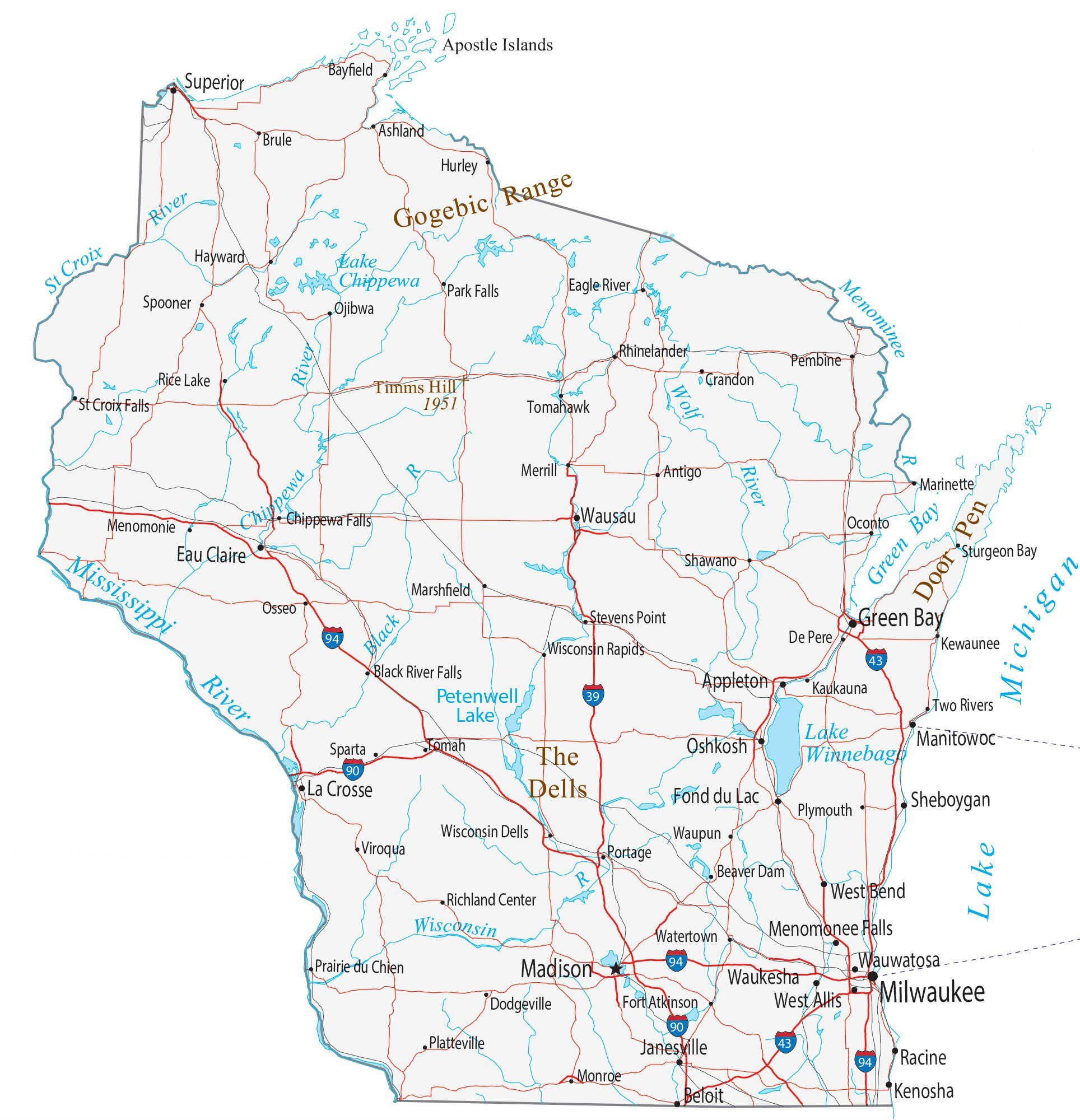Ensuring your septic system complies with Wisconsin’s regulations is crucial for both the environment and the health of your property. Septic systems are the preferred wastewater disposal method in rural areas where public sewer systems are not available. If you own or are planning to install a septic system in Wisconsin, it is essential to familiarize yourself with the state’s septic tank regulations, maintenance guidelines, and installation procedures. This article provides a comprehensive look into Wisconsin septic tank regulations, including required permits, septic tank sizing, maintenance, and the environmental impact of proper wastewater disposal.
Table of Contents
- State-Specific Regulations Information
- Wastewater Disposal
- Maintenance and Pumping
- Compliance Information
- Cost Information – Cost of Septic Tank Permit in Wisconsin
- Local Resources & Contact Information
- Supportive Resources
- Frequently Asked Questions About Wisconsin Septic Tank Regulations
State-Specific Regulations Information
Installation Permits
In Wisconsin, installation of a septic system requires a permit issued by the local health department or a designated authority. Before beginning installation, you must submit an application that includes site evaluation and design details. The permit ensures that the septic system meets the standards set by the state and protects public health and the environment.
The cost of septic system permits varies depending on the county and the complexity of the system. On average, permit fees range from $100 to $500. However, local authorities may assess additional fees for inspections or environmental assessments, depending on the property and local regulations. It is essential to contact the local health department or county environmental office to get an accurate estimate of permit costs.
Septic Tank Size and Placement
Factors like the number of bedrooms, soil type, and site location determine the size of the septic tank and the placement of the drain field in Wisconsin. Wisconsin regulations require that septic systems handle wastewater efficiently without harming the surrounding environment. These guidelines help maintain water quality and prevent contamination while protecting local ecosystems.
For standard single-family homes, septic tanks must have a capacity of at least 1,000 gallons, though larger systems may be necessary for homes with more occupants. You must place the tank a certain distance from water sources like wells and streams to prevent contamination. Additionally, install the drain field in an area with suitable soil to ensure proper filtration and absorption.
Wastewater Disposal
Wisconsin septic tank regulations are strict regarding wastewater disposal. All household wastewater—such as from toilets, sinks, showers, and laundry—must be processed through the septic system. Proper disposal is crucial for preventing groundwater contamination and protecting local ecosystems. By ensuring systems are well-maintained, homeowners help safeguard water quality and prevent pollution
In some regions of Wisconsin, specific wastewater management practices are mandated. The Wisconsin Department of Natural Resources (DNR) enforces wastewater management rules to ensure compliance with the state’s environmental standards. For instance, any discharges that may potentially pollute groundwater or surface water are strictly prohibited.
Homeowners are encouraged to use water-saving devices and adopt practices that reduce the strain on their septic systems. Overloading a septic system with excessive wastewater can lead to system failure and expensive repairs.
Maintenance and Pumping
Proper maintenance of your septic system is essential for its longevity and efficiency. The Wisconsin Department of Health Services (DHS) and local health departments recommend regular pumping and inspection to ensure the system functions properly. Homeowners should pump a typical septic tank every three to five years, depending on the tank size and the number of people in the household. Regular pumping helps maintain system function and prevents buildup that could lead to clogs or failure
Neglecting regular maintenance can lead to costly repairs and the need for system replacement. Failing to pump the septic tank on time may result in sludge buildup, leading to clogs in the drain field and possible backups. Regular inspections also help identify issues before they become significant problems, such as cracks in the tank or leaks in the piping.
Maintenance also involves ensuring that the drain field is free of debris, vegetation, or heavy traffic that could compact the soil or damage the pipes. By keeping the drain field area well-maintained, homeowners can prevent blockages and ensure proper wastewater filtration.
Compliance Information
Potential Fines/Penalties
Wisconsin takes compliance with septic tank regulations seriously. If, homeowners fail to obtain the proper permits or neglect maintenance schedules, they could face fines and penalties. Local health departments and environmental agencies in Wisconsin can impose fines for septic system violations. In some cases, individuals may be required to install a new system to meet regulatory standards.
In addition to financial penalties, improper installation or maintenance can cause environmental damage. Septic systems that are improperly installed or maintained can leak sewage into the environment, contaminating groundwater and surface water, which could lead to public health issues.
Environmental Protections
Wisconsin has established specific environmental protections related to wastewater management to safeguard public health and the state’s natural resources. The Wisconsin (EPA) and the DNR enforce strict rules on the use, installation, and maintenance of septic systems. These regulations protect Wisconsin’s water quality and wildlife, preventing pollution in lakes, rivers, and streams.
The state’s environmental quality standards require all septic systems to be properly designed, installed, and maintained. The DNR monitors the systems through routine inspections to ensure they meet the state’s wastewater disposal standards.
Cost Information – Cost of Septic Tank Permit in Wisconsin
Permit Fees
The cost of septic system permits in Wisconsin typically ranges from $100 to $500; however, fees can vary by county. Therefore, homeowners should contact their local health department for precise permit costs and inquire about additional charges, such as site evaluations or environmental assessments.
Pumping Costs
Septic tank pumping costs range from $250 to $500, depending on tank size, property location, and the provider. Regular pumping is necessary to prevent clogs and other issues, which can lead to costly repairs if ignored. It is important to budget for regular septic maintenance as part of your property’s upkeep.
Installation Estimates
The cost of installing a new septic system in Wisconsin ranges from $3,000 to $10,000, depending on factors like system, tank size, and property location. Factors such as soil conditions and the proximity to water sources may affect the installation costs. Homeowners should obtain multiple estimates from certified septic contractors to ensure competitive pricing.
Local Resources & Contact Information
Wisconsin has a network of local health departments and environmental agencies responsible for overseeing septic tank regulations. Some key agencies include:
- Wisconsin Department of Natural Resources (DNR)
Website: https://dnr.wi.gov - Wisconsin Department of Health Services (DHS)
Website: https://www.dhs.wisconsin.gov
Local health departments can provide more information about permit requirements and the specific regulations for your county. The Wisconsin DNR is responsible for enforcing environmental regulations related to wastewater management and septic systems.
Supportive Resources
To help you navigate Wisconsin’s septic system regulations, here are some valuable resources:
- Wisconsin Health Department Guidelines: https://www.dhs.wisconsin.gov/
- Wisconsin Septic System Handbook: Available through local health departments or online.
- Certified Septic Service Providers: Websites like Septic Tank Services list certified septic system professionals across Wisconsin.
Conclusion
Understanding and complying with Wisconsin septic tank regulations is essential for property owners. Ensure you follow permits, maintenance, and environmental standards to protect the environment and avoid costly repairs. Always reach out to local health departments for up-to-date information on septic tank regulations in your area.
Frequently Asked Questions About Wisconsin Septic Tank Regulations
Why did I receive a notice regarding septic system maintenance?
In Wisconsin, state regulations (SPS 383.54) mandate that all septic systems be inspected every three years. This inspection ensures that the system is functioning correctly, and that wastewater is not spilling or backing up. If your system hasn’t been inspected within the required timeframe, you’ll receive a notice from your local zoning or health department. If you’ve had the system pumped recently, you may simply need to submit a verification form from your service provider Winnebago County Waushara County.
What happens if I don’t get my septic system inspected?
Failure to inspect or maintain your septic system can lead to serious issues, such as system failure or contamination of local water supplies. Consequently, neglecting maintenance can result in costly repairs or legal action. Wisconsin law requires all septic systems to be maintained, and failure to comply could result in fines. In some cases, continued non-compliance may result in legal actionWaushara County Wood County Wisconsin.
Can I install a holding tank instead of a septic system?
Yes, holding tanks are an option in Wisconsin, but they are only approved in certain situations. For instance, if your property has limited space, unsuitable soil conditions, or other restrictions, a holding tank may be installed. However, it is essential to note that holding tanks require regular pumping, and the maintenance must be documented Winnebago County Wood County Wisconsin.
How close can I build to a septic system or well?
Wisconsin regulations require specific setbacks from septic systems to avoid contamination. A 5-foot setback is required from the exterior of the tank, while the drainfield must be at least 15 feet away from any building or well. If you plan to build near your septic system or well, it’s important to follow these guidelines to ensure proper drainage and avoid health hazards Winnebago County Waushara County.
Directory | Washington Septic Service Providers | Part 2
Directory | Washington Septic Service Providers | Part 1
DIY Repairs Are Always Cheaper
Septic Regulations in Rural Areas: Essential Guide for Rural Property Owners
The Role of Perforated Pipes in Drain Fields
What Happens During a Pumping Service?







